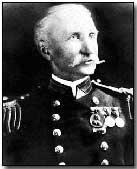Who's Who - Bradley Allen Fiske
 Bradley Allen Fiske (1854-1942) was the
head of the U.S. Navy from 1913-15 and acted to modernise its capabilities
for conducting war in the modern era.
Bradley Allen Fiske (1854-1942) was the
head of the U.S. Navy from 1913-15 and acted to modernise its capabilities
for conducting war in the modern era.
Fiske, who was born on 13 June 1854 in New York, combined his naval career with a remarkable talent for inventiveness, and had many patents credited to his name. Having graduated from Annapolis in 1874 he promptly took a year's leave to study electricity, later administering its installation in newly commissioned U.S. naval ships during the 1880s.
Among his other inventions he claimed credit for developing new range finders, telescopes and, in particular, was a noted inventor of electro-mechanical shipboard appliances.
Fiske saw active service during the Spanish-American War of 1898 before becoming Deputy Commander of the Atlantic Fleet and then aide to the Secretary of the Navy in 1910. Promoted Rear-Admiral in 1911 Fiske's penchant for innovation continued unabated; in 1912 he received a patent for a torpedo aircraft.
Like his contemporary at the Royal Navy, Admiral John Fisher, Fiske was an enthusiastic, energetic proponent of reform within the U.S. Navy, particulalrly in the area of education and training. Unlike Fisher however, Fiske advocated the creation of a professional naval General Staff (Fisher despised staff work in all its forms).
Consequently - and having been appointed head of the U.S. Navy in 1913 - Fiske brought about, in 1915, the creation of the post of Chief of Naval Operations, bringing to fruition his belief in an effective naval staff.
The advent of war in Europe in August 1914 brought Fiske into conflict with the Secretary of the Navy, Josephus Daniels. Daniels, who was determined to protect America's status as a neutral power, forbade Fiske from conducting war games and remained suspicious of a naval war staff; he also acted to halve the U.S. Navy's current shipbuilding programme. Contingency planning was also forbidden.
Finding Daniels' restrictions unworkable Fiske chose to resign in May 1916. Fiske, who also served as President of the U.S. Naval Institute from 1911-23, published widely (including From Midshipman to Admiral in 1919) and has been credited with originating the strategic war game and for being the father of American naval aviation.
A Rear-Admiral in retirement, Fiske died on 6 April 1942 in New York City aged 87.
"Eggs-a-cook" were boiled eggs sold by Arab street vendors. It was later used by Anzac soldiers when going over the top.
- Did you know?
